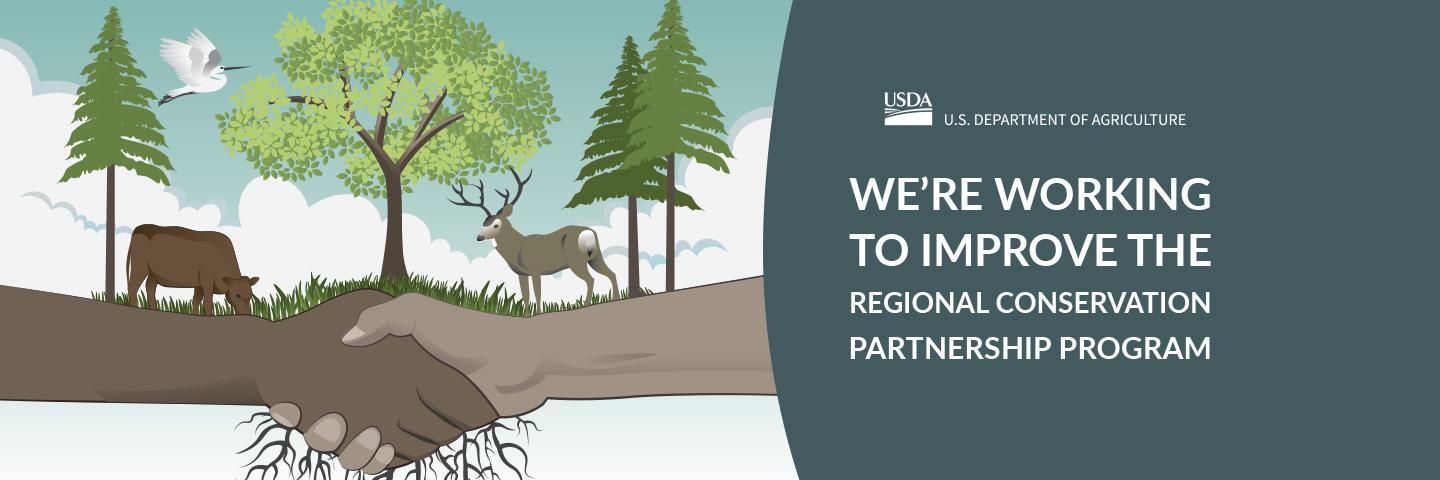FACT SHEET: USDA Streamlines Regional Conservation Partnership Program, Invests Unprecedented $1 Billion in 81 Conservation Projects

The U.S. Department of Agriculture (USDA) is making historic investments to the Regional Conservation Partnership Program (RCPP) and streamlining the program to make it work better for producers and partners. This combination will deliver conservation at a scale never before achieved through RCPP.
The U.S. Department of Agriculture (USDA) is making historic investments to the Regional Conservation Partnership Program (RCPP) and streamlining the program to make it work better for producers and partners. This combination will deliver conservation at a scale never before achieved through RCPP. This year, more than $1 billion is being invested to advance partner-driven solutions to conservation on agricultural land through 81 projects.
RCPP leverages a voluntary approach to conservation that expands the reach of conservation efforts and climate-smart agriculture through public-private partnerships. Historic funding is made possible by both the Inflation Reduction Act, part of President Biden’s Investing in America agenda, and the Farm Bill.
RCPP Improvements
USDA’s Natural Resources Conservation Service (NRCS) has identified ways to streamline and simplify RCPP, ease the burden on employees and partners, and help maximize flexibility for partners to leverage their investments with NRCS resources and capabilities.
Through a concerted effort over the past eight months, using guidance, feedback and expertise from partners, employees, leadership and stakeholders, NRCS has identified several improvements that the agency will implement in the months and years ahead.
Improvements include:
- Streamlining RCPP agreements for fiscal year 2023 awards and moving to one programmatic agreement to begin implementing the RCPP projects awarded under the fiscal year 2024 notice of funding opportunity. This will allow partners to more quickly begin implementation of their RCPP projects.
- Entrusting program management and negotiation to the State Conservationists, who lead NRCS programs in each state, further encouraging the locally led process and ensuring the necessary technical needs and costs were realized before project proposal submission.
- Establishing parameters and expectations for easement negotiations, including availability of easement deed templates and established program processes to reduce partnership agreement negotiation and implementation timeframes.
- Improving RCPP guidance and training, ensuring RCPP policies and procedures are communicated in a uniform and consistent manner.
- Enhancing existing business tools to improve the user experience while beginning development of new business tools that, through integration and automation, will reduce the time required for agreement negotiation, processing obligations and making payments to partners.
For the full list of RCPP improvements NRCS has identified for future implementation, visit our website.
Once improvements have been implemented, NRCS estimated that the negotiation time of RCPP agreements with U.S.-held easement activities will be reduced from 15 months to three months, and from 19 months to three months with entity-held easement activities.
The RCPP improvements are coming at a critical time, as they will strengthen NRCS’ ability to implement the Inflation Reduction Act, which provided $4.95 billion in additional funding for the program over five years.
Unprecedented RCPP Funding
The Farm Bill and Inflation Reduction Act provided funding for this year’s RCPP projects. With this more than $1 billion investment, NRCS has more than doubled the initial allocation for 2023 to capitalize on the unprecedented demand for RCPP and ensure project partners have the maximum amount of time to successfully implement conservation activities before funds expire in fiscal year 2031.
Of the awarded projects:
- 77 climate-focus projects ($1.02 billion in funding).
- Twenty-two projects focused on water quantity and conservation (more than $338 million in funding).
- Three RCPP Classic projects are led by Tribes (more than $58 million in funding).
- Sixteen projects support the protection and restoration of wildlife corridors ($216 million in funding).
- Ten projects focus on urban agriculture ($123 million in funding).
For a full list of selected projects visit our website.
Since inception, RCPP has made 717 awards involving over 4,000 partner organizations.
Inflation Reduction Act Boosts Voluntary Conservation Programs
Through the Inflation Reduction Act, USDA has enrolled more farmers and more acres in voluntary conservation programs than at any point in history, following a backlog that has existed for years. In 2023, USDA enrolled nearly 5,300 additional producers in conservation programs across all 50 states (above what otherwise would have been possible through Farm Bill and appropriations funding), which will provide significant climate mitigation benefits. This includes:
- $100 million through the Agricultural Conservation Easement Program (ACEP);
- $250 million through the Conservation Stewardship Program (CSP); and
- $250 million through the Environmental Quality Incentives Program (EQIP).
#
USDA is an equal opportunity provider, employer and lender.

